The Role of Bees in Saving the Planet: Why These Tiny Insects Matter More Than You Think
When people think of life-saving heroes, bees rarely come to mind. Yet these small pollinators are silently holding up ecosystems, food systems, and biodiversity on a global scale. As bee populations decline, scientists, farmers, and environmentalists are sounding the alarm: saving bees may be critical to saving the planet.

Why Are Bees So Important?
Bees play a fundamental role in pollination, the process of transferring pollen between flowering plants. This seemingly simple act enables plants to reproduce and bear fruit. In fact, over 75% of the world’s food crops depend to some extent on pollinators like bees. These include apples, almonds, blueberries, cucumbers, coffee, and more.
Without bees, not only would diets become less diverse, but global food production would drop dramatically, leading to increased food scarcity and rising prices.
Bees and Biodiversity
Bees support biodiversity by enabling the reproduction of a vast array of wild plants. These plants, in turn, provide food and habitat for countless other species—from insects to birds to mammals. A healthy bee population is a direct indicator of a balanced ecosystem.
In forests, meadows, and even cities, bees help maintain floral diversity, which strengthens resilience to climate change and environmental stressors.
Bees as Environmental Indicators
Because bees are highly sensitive to changes in their environment, they serve as bioindicators—early warning signs of ecological trouble. Sharp declines in bee populations often signal the presence of toxic pesticides, habitat loss, or climate shifts. By protecting bees, we gain insight into the health of our ecosystems and can act faster to prevent further degradation.
Threats Facing Bee Populations
Bees are in crisis across many parts of the world. Key threats include:
- Pesticides, especially neonicotinoids, which impair navigation and foraging
- Habitat loss due to urbanization and industrial agriculture
- Climate change, disrupting blooming cycles and weather patterns
- Parasites and diseases, such as the Varroa mite
The combination of these factors has led to mass die-offs in some regions and a worrying decline in global bee diversity.
How Bees Help Fight Climate Change
Bees contribute to carbon sequestration indirectly by supporting healthy plant growth. More pollination means more vegetation, which in turn absorbs more CO₂. Additionally, forests and other plant-rich ecosystems pollinated by bees help regulate temperature, retain water, and prevent soil erosion.
What Can We Do to Protect Bees?
There are several ways individuals, communities, and governments can support bee populations:
- Plant pollinator-friendly gardens with native flowers and herbs
- Avoid using pesticides or opt for organic alternatives
- Support local beekeepers and buy raw, local honey
- Advocate for bee-friendly policies in agriculture and land use
- Educate others about the critical role bees play in sustaining life
Even small actions can add up to make a meaningful difference.
Conclusion
Bees are not just a part of nature—they are a cornerstone of it. Their role in pollination affects everything from the food we eat to the stability of our ecosystems. As stewards of the planet, it’s our responsibility to protect these incredible insects before their decline becomes irreversible. Saving bees is not just about saving insects—it’s about preserving the intricate web of life that keeps our planet thriving.








